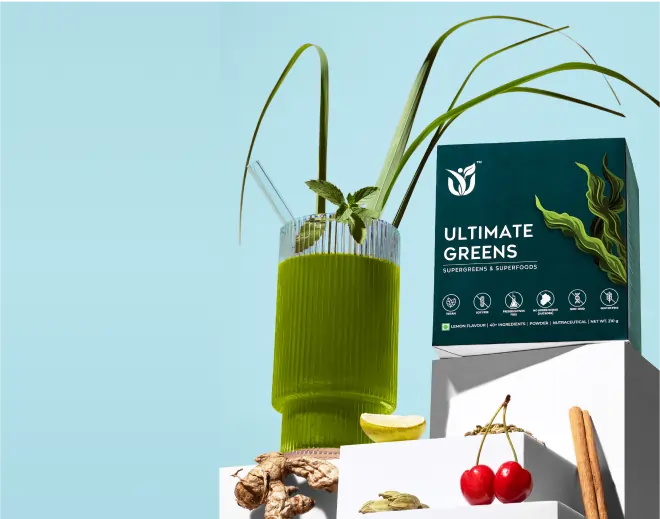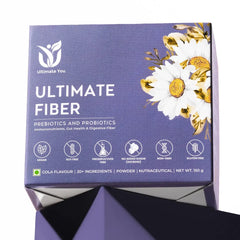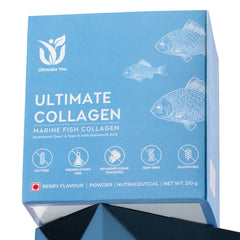Fuel your body this winter with 10 nutrient-rich superfoods that enhance immunity, promote warmth, and ensure optimal health during the chilly season.
Winter often brings chilly days, lower immunity, and the constant battle to stay energized. But here's the good news: the solution to thriving this season lies on your plate. Seasonal superfoods not only keep you warm but also provide the essential nutrients your body craves during the colder months. From vibrant citrus fruits to omega-rich nuts, these powerhouse foods are your natural defence against the winter blues.
Imagine a season where you feel healthy, active, and glowing despite the frosty weather. By choosing the proper superfoods, you can nourish your body, boost immunity, and even improve your mood.
Whether you're looking to prevent seasonal sniffles or want to embrace winter wellness, these top 10 seasonal superfoods are your ultimate guide.
Ready to transform your winter diet into a health-boosting experience? Let's dive in!
Top 10 Winter Superfoods to Keep You Warm and Healthy
Cold winds, dark days, and sniffles—winter doesn’t have to win! With these 10 immune-boosting superfoods, you can stay strong, energized, and glowing all season long. From cozy bowls of oats to warming spices like ginger and turmeric, these natural winter warriors are ready to transform your health and keep you feeling your best, no matter how cold it gets.
1) Ginger
Ginger is a must-have winter superfood, thanks to its warming properties and ability to fight colds. It helps improve blood flow, keeping the body warm during chilly days. Ginger also boosts immunity, improves digestion, and relieves muscle pain.
Its soothing effects also combat nausea and reduce symptoms of colds and sore throats, making it especially useful in the winter months. Whether in teas, soups, or added to meals, ginger provides a natural and comforting way to stay healthy and feel better. Its powerful effects make it an ideal addition to your winter routine.
Nutrition: Ginger is low in calories and rich in vitamins like B6, minerals such as magnesium, and antioxidants.
|
Nutrients |
Per 100 Grams |
|
Vitamin B6 |
0.16 mg |
|
Magnesium |
43 mg |
|
Folate |
11 μg |
|
Potassium |
415 mg |
Key Compounds: It contains gingerol, a bioactive compound with powerful anti-inflammatory and antioxidant properties.
2) Turmeric
Turmeric is a powerful winter staple, known for its anti-inflammatory and immune-boosting properties. It helps reduce inflammation, fight infections, and improve joint health, making it perfect for colder months. Packed with antioxidants, turmeric also protects your cells from damage, promoting overall health.
On top of its physical benefits, turmeric is known to boost mood, helping you stay positive during gloomy winter days. For best results, pair turmeric with black pepper, as it enhances the absorption of curcumin, its key active compound. Whether added to curries, teas, or smoothies, turmeric is an easy and effective way to support your health and well-being throughout the season.
Nutrition: Rich in manganese, iron, and potassium, turmeric also contains essential vitamins like C and B6.
|
Nutrients |
Per 100 Grams |
|
Phosphorous |
28.1 mg |
|
Sodium |
38 mg |
|
Potassium |
2,525 mg |
|
Iron |
5.17 mg |
Key Compounds: Curcumin, the active compound, is responsible for its vibrant yellow color and numerous health benefits.
3) Sweet Potatoes
Sweet potatoes are a nutritious winter food, packed with beta-carotene to strengthen immunity and support eye health. Their high fiber content aids digestion and promotes gut health, while complex carbohydrates provide steady energy throughout the day.
Versatile and naturally sweet, they can be roasted, mashed, or added to soups, making them a comforting addition to any meal. Enjoy sweet potatoes to boost immunity, improve digestion, and maintain energy levels during the colder months.
Nutrition: Packed with fiber, Vitamin A (in the form of beta-carotene), Vitamin C, and potassium.
|
Nutrients |
Per 100 Grams |
|
Vitamin A |
961 μg |
|
Vitamin C |
19.6 mg |
|
Potassium |
475 mg |
|
Calcium |
38 mg |
Key Compounds: Beta-carotene is the star nutrient, supporting skin health and immunity.
4) Oranges
Oranges are a winter essential due to their high vitamin C content, which strengthens the immune system and helps the body fight off colds and infections. This powerful antioxidant supports white blood cell production, boosting immunity and defending against seasonal illnesses.
Beyond immunity, oranges promote healthy skin by keeping it hydrated and glowing during dry winter months. Vitamin C aids collagen production, enhancing skin elasticity, and reducing wrinkles. Whether enjoyed as a snack or added to smoothies, salads, or juices, oranges are a delicious and effective way to support overall health.
Nutrition: Oranges are rich in Vitamin C, potassium, and folate and are low in calories.
|
Nutrients |
Per 100 Grams |
|
Vitamin C |
53.2 mg |
|
Folate |
30 μg |
|
Potassium |
181 mg |
|
Choline |
8.4 mg |
Key Compounds: They contain flavonoids, which have powerful antioxidant and anti-inflammatory properties.
5) Spinach
Spinach is a nutrient-packed green that boosts immunity with vitamins A, C, and K. It's also rich in calcium and magnesium for strong bones, while its fiber promotes healthy digestion. Packed with antioxidants like lutein and beta-carotene, it protects cells from oxidative stress. Whether in salads, soups, or smoothies, spinach is a versatile, easy way to nourish your body, supporting long-term health and overall wellness.
Versatile in meals, spinach can be added to salads, soups, or smoothies. Incorporating spinach into your diet is a simple yet effective way to nourish your body and promote wellness.
Nutrition: Spinach is high in iron, calcium, Vitamin C, and folate, along with potent antioxidants.
|
Nutrients |
Per 100 Grams |
|
Calcium |
99 mg |
|
Magnesium |
79 mg |
|
Iron |
2.71 mg |
|
Vitamin C |
28 mg |
Key Compounds: It contains lutein and zeaxanthin, which support eye health, and nitrates that improve blood flow.
6) Walnuts
Walnuts are an exceptional winter snack that offers a variety of health benefits, making them an ideal addition to your seasonal diet. Packed with healthy fats, they provide warmth and energy during the colder months, helping to keep you cozy and satisfied. Walnuts are rich in omega-3 fatty acids, which promote heart health and reduce inflammation, supporting your cardiovascular system during winter.
Additionally, walnuts boost brain function due to their high content of antioxidants, vitamin E, and folate. These nutrients enhance cognitive performance and memory, which is especially beneficial during the winter months. Their anti-inflammatory properties further help combat the winter chill and support overall wellness.
Nutrition: They’re rich in omega-3 fatty acids, Vitamin E, magnesium, and antioxidants.
|
Nutrients |
Per 100 Grams |
|
Beta-Carotene |
12 μg |
|
Vitamin K |
2.7 μg |
|
Zinc |
3.09 mg |
|
Folate |
98 μg |
Key Compounds: Walnuts contain alpha-linolenic acid (ALA), a plant-based omega-3, and polyphenols that fight oxidative stress.
7) Honey
Honey is a potent natural remedy, providing a wide range of health benefits, particularly during the winter season. Known for its energy-boosting properties, honey provides a quick source of fuel, making it an ideal addition to your winter diet. Whether added to warm beverages or consumed on its own, it soothes sore throats, a common winter ailment.
Moreover, its antibacterial qualities help support your immune system and combat minor infections, which are more common in colder weather. Honey also reduces inflammation, offering relief for coughs and colds. With its rich antioxidants and natural enzymes, it promotes overall wellness.
Nutrition: Honey is rich in natural sugars, antioxidants, and small amounts of vitamins and minerals like niacin and riboflavin.
|
Nutrients |
Per 100 Grams |
|
Calcium |
6 mg |
|
Potassium |
52 mg |
|
Phosphorus |
4 mg |
|
Riboflavin (B2) |
0.038 mg |
Key Compounds: It contains flavonoids and phenolic acids, which have antioxidant effects.
8) Oats
During the chilling months, many people struggle with feeling sluggish or low on energy, especially in the mornings. Cold temperatures and darker days often lead to cravings for comfort foods, but it's important to choose options that fuel the body properly.
Oats are an ideal breakfast choice, offering a nutritious start to the day. Rich in soluble fiber, oats support digestive health and promote regularity. Thanks to their high fiber content, oats also keep you feeling satisfied for longer. Whether enjoyed with fruits, nuts, or spices, oats are a versatile and comforting food that provides warmth, nutrition, and sustained energy to kick-start your day.
Nutrition: Rich in fiber, particularly beta-glucan, oats also provide protein, magnesium, and iron.
|
Nutrients |
Per 100 Grams |
|
Folate |
56 μg |
|
Potassium |
429 mg |
|
Magnesium |
177 mg |
|
Iron |
5 mg |
Key Compounds: Beta-glucan supports heart health and boosts the immune system.
9) Carrots
Carrots are a crunchy, nutrient-packed root vegetable that offer numerous health benefits, especially during winter. Carrot phytochemicals like carotenoids and vitamin C offer anticancer, antioxidant, anti-inflammatory, and mood-boosting benefits, says NIH (National Institutes of Health).
On top of that, carrots also contribute to healthy skin, keeping it hydrated and glowing during dry winter months. Their natural sweetness makes them a versatile ingredient for soups, salads, and snacks.
Nutrition: They’re rich in vitamin A, fiber, and potassium.
|
Nutrients |
Per 100 Grams |
|
Vitamin C |
5.9 mg |
|
Vitamin A |
835 μg |
|
Potassium |
320 mg |
|
Vitamin K |
13.2 μg |
Key Compounds: Beta-carotene is converted to Vitamin A in the body, crucial for immune function and vision.
10) Pumpkin Seeds
Pumpkin seeds are a nutrient-dense winter snack that offers a variety of health benefits. Rich in essential minerals like magnesium, iron, and zinc, they provide warmth and support overall wellness during the colder months. Their high zinc content helps boost immunity, aiding your body in fighting off winter illnesses and infections.
They also provide a natural energy boost, helping you stay active and alert during the colder months. The zinc in pumpkin seeds also supports wound healing and tissue repair, promoting resilience throughout the season.
Nutrition: They’re high in zinc, magnesium, healthy fats, and protein.
|
Nutrients |
Per 100 Grams |
|
Zinc |
7.64 mg |
|
Magnesium |
550 mg |
|
Niacin |
4.43 mg |
|
Vitamin K |
4.5 μg |
Key Compounds: The phytosterols and antioxidants in pumpkin seeds support overall health and reduce inflammation.
Conclusion
As winter sets in, it's the perfect time to nourish your body with seasonal superfoods that support your health and well-being. From immunity-boosting citrus fruits to warming spices like turmeric and cinnamon, these nutrient-packed foods help you stay energized and fight off seasonal illnesses.
Incorporating superfoods into your daily meals ensures that you're fueling your body with essential vitamins and minerals, keeping you warm and strong throughout the colder months. Remember, balance is key. Enjoy these superfoods in moderation for maximum benefit.
What are your favourite winter foods? Could you share them in the comments below?
Disclaimer
The information provided is for educational purposes only and is not intended to be a substitute for medical treatment. If you're pregnant, nursing, taking medication, or have a medical condition, it's better to consult a healthcare professional. Ultimate You does not provide any guarantee regarding the accuracy, adequacy, completeness, legality, reliability, or usefulness of the information and disclaims any liability arising from it.

Ram Charan
Content Lead
With over 7 years of experience, he crafts engaging stories and compelling narratives. He believes crisp and engaging content adds value to customers and drives immense sales to businesses. When he's not working, you'll find him hanging out with friends, binge-watching movies, and exploring the world of organic foods.
Tags
- Choosing a selection results in a full page refresh.
- Opens in a new window.
15%

on your next order
By submitting your email address, you agree to receive marketing emails from Ultimate You at the email address provided. We may use information collected about you on our site to suggest the products and offers. you can withdraw your consent at any time by following the unsubscribe instructions in any email we send to you. view Terms and Privacy. Contact Ultimate Customer Care at #204-8430 Saint Monica Building, near Char Miner, Hyderabad, India, 203455.





